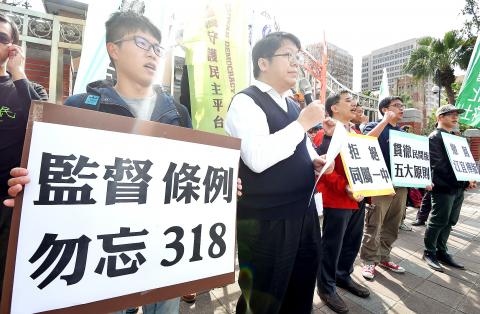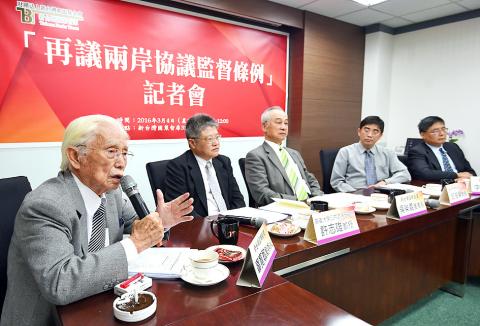Proposed supervisory regulations governing negotiations with China should not include any language downplaying national sovereignty, civic campaigners said yesterday in a protest outside the Legislative Yuan.
“From the first character to the last, there should not be any expressions like ‘area’ or anything else that could create the misunderstanding that Taiwan belongs to China,” Economic Democracy Union convener Lai Chung-chiang (賴中強) said, adding that his group would reject any version that used loaded words — such as “the mainland” (大陸) — that suggest Taiwan does not already possess full sovereignty.
Sovereignty-related wording differences have been in the spotlight as competing versions of regulations have been referred to the Legislative Yuan’s Internal Administration Committee for review.

Photo: Liao Chen-huei, Taipei Times
While the Executive Yuan version supported by the Chinese Nationalist Party (KMT) uses “the Taiwan area” to refer to the nation, individual legislators have proposed using “Taiwan,” with pan-green camp political parties seeking to split the difference.
The Democratic Progressive Party (DPP) has said that a version to be announced next week would be within the framework of the Republic of China Constitution, while the New Power Party (NPP) version uses “our nation.”
Lai said his group rejected using the “Republic of China” constitutional framework, while “our nation” could be acceptable depending on the context.

Photo: Liu Hsin-de, Taipei Times
However, he added that the current public focus on sovereignty-related wording, rather than on the content of legislation, was “too narrow.”
The regulations are intended to guarantee greater civic participation in negotiations with China following Sunflower movement protests against opaque and secretive trade talks under the Economic Cooperation Framework Agreement (ECFA).
At a separate news conference, NPP Legislator Hsu Yung-ming (徐永明) blasted the implementation of the ECFA by President Ma Ying-jeou’s (馬英九) administration.
“There was no analysis of the effects on all the different industries and now we can see the consequences,” Hsu said, accusing the administration of having made misleading claims about trade benefits that have not been realized.
National Cheng Kung University law professor Hsu Chung-hsin (許忠信) said that the ECFA had failed to increase exports as promised, in part because of “dynamic effects” that encouraged businesses to move operations to China.
While the agreement explicitly excluded agricultural products, it created expectations that the nation’s agricultural market would eventually be opened, indirectly bolstering China’s agricultural sector by encouraging Taiwanese producers to invest and transfer technology.
“We would have expected ‘early harvest’ products to get better results overall, but they have actually done worse,” he said, referring to the list of agricultural products for which China agreed to unilaterally drop tariffs.
Extensive analysis and reporting requirements on the effects of cross-strait agreements are a key provision of the “civic version” of supervisory regulations proposed following the 2014 Sunflower movement.
The legislative general assembly referred the draft bills proposed by DPP legislators Yu Mei-nu (尤美女) and Lee Chun-yi (李俊俋) and the NPP caucus to the Internal Administration Committee for review.
In her draft bill, Yu used “cross-strait” to describe the relationship between Taiwan and China, while Lee used “Taiwan” and “China” and the NPP used “our nation” and “the People’s Republic of China.”

NATIONAL SECURITY THREAT: An official said that Guan Guan’s comments had gone beyond the threshold of free speech, as she advocated for the destruction of the ROC China-born media influencer Guan Guan’s (關關) residency permit has been revoked for repeatedly posting pro-China content that threatens national security, the National Immigration Agency said yesterday. Guan Guan has said many controversial things in her videos posted to Douyin (抖音), including “the red flag will soon be painted all over Taiwan” and “Taiwan is an inseparable part of China,” while expressing hope for expedited “reunification.” The agency received multiple reports alleging that Guan Guan had advocated for armed reunification last year. After investigating, the agency last month issued a notice requiring her to appear and account for her actions. Guan Guan appeared as required,

A strong cold air mass is expected to arrive tonight, bringing a change in weather and a drop in temperature, the Central Weather Administration (CWA) said. The coldest time would be early on Thursday morning, with temperatures in some areas dipping as low as 8°C, it said. Daytime highs yesterday were 22°C to 24°C in northern and eastern Taiwan, and about 25°C to 28°C in the central and southern regions, it said. However, nighttime lows would dip to about 15°C to 16°C in central and northern Taiwan as well as the northeast, and 17°C to 19°C elsewhere, it said. Tropical Storm Nokaen, currently

‘NATO-PLUS’: ‘Our strategic partners in the Indo-Pacific are facing increasing aggression by the Chinese Communist Party,’ US Representative Rob Wittman said The US House of Representatives on Monday released its version of the Consolidated Appropriations Act, which includes US$1.15 billion to support security cooperation with Taiwan. The omnibus act, covering US$1.2 trillion of spending, allocates US$1 billion for the Taiwan Security Cooperation Initiative, as well as US$150 million for the replacement of defense articles and reimbursement of defense services provided to Taiwan. The fund allocations were based on the US National Defense Authorization Act for fiscal 2026 that was passed by the US Congress last month and authorized up to US$1 billion to the US Defense Security Cooperation Agency in support of the

PAPERS, PLEASE: The gang exploited the high value of the passports, selling them at inflated prices to Chinese buyers, who would treat them as ‘invisibility cloaks’ The Yilan District Court has handed four members of a syndicate prison terms ranging from one year and two months to two years and two months for their involvement in a scheme to purchase Taiwanese passports and resell them abroad at a massive markup. A Chinese human smuggling syndicate purchased Taiwanese passports through local criminal networks, exploiting the passports’ visa-free travel privileges to turn a profit of more than 20 times the original price, the court said. Such criminal organizations enable people to impersonate Taiwanese when entering and exiting Taiwan and other countries, undermining social order and the credibility of the nation’s